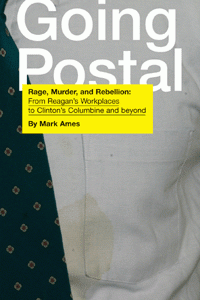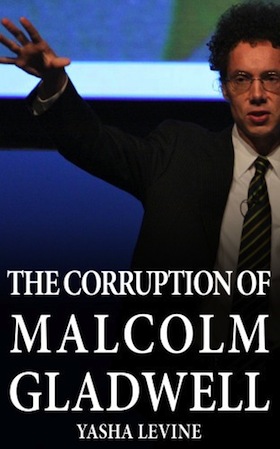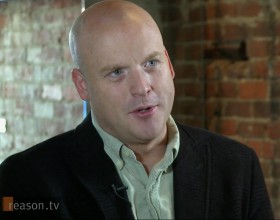This article was first appeared in The eXiled on August 6, 2009
Just when you think you've seen so much hypocrisy that nothing can shock you, along comes Megan McArdle. McArdle, who blogs for the Atlantic Monthly, presents herself as a principled libertarian, fiercely denouncing any attempt to provide any sort of government-funded health care, because as she argues, big government is bad, bad, bad. She's written some truly appalling things over the years as a shill for big corporate interests, recently defending Goldman Sachs because, as she wrote, "financial meltdowns offer no villains."
Last week, McArdle posted an encyclopedia-length article on the Atlantic Monthly's site, denouncing Obama's health care plan in a rambling piece that essentially boiled down to this: big government is a bad thing, and free markets are the medicine you need, even if you don't like it, and even though you can't afford it. McArdle's post sparked a series of smackdowns, including Ezra Klein in the Washington Post , and Jane Hamsher at Firedoglake.
What Megan McArdle doesn't mention is that her own privileged upbringing was funded by public money. That's right, Megan McArdle is just a second-generation product of the sleazy NYC construction business, which has been using public money for private gain since the Tammany Hall era. Even more galling is that Megan's father got his start in the public sector working in taxpayer-funded health care programs. If it weren't for her father's employment as a public health care official in the 1970s, Megan McArdle's life might have turned out completely different from the privileged one she enjoyed.
Megan McArdle is the daughter of one Francis X. McArdle, who built his career as a public servant in the New York City administration, then moved over to the private side, where he could leverage his contacts with the government -- and finally moved back onto the public payroll in 2006, when Mr. McArdle was appointed by then-Sen. Hillary Clinton to advise the federal government how public funds should be spent, and on whom. Earlier this year, Mr. McArdle was reportedly in Albany lobbying the New York state government for a job as the "stimulus czar," appropriating President Obama's federal spending money.
Megan was born in 1973, a few years after Francis got his big fat job on the public payroll in the New York City administration, where he stayed for 11 years. Among the first big jobs Megan's daddy took while climbing up the public payroll career ladder were jobs as Inspector General for the New York City Health and Hospitals Corporation, and Director of Program Budget for the New York City Health and Hospitals Corporation.
So Megan McArdle's entry into this world was literally greased by taxpayer funds. But of course, it wouldn't stop there.
Francis McArdle, rose up the Big Government ranks in the New York city. His public-funded career reached its peak in 1978 when then-Mayor Ed Koch named him as Commissioner of the New York City Department of Environmental Protection, where he served until 1981. That job put McArdle in control of all sorts of public works: water supply, waste water, sewage infrastructure. It's kind of fitting that McArdle's privileged childhood was funded by taxpayer's shit and urine -- a Freudian might say that this is the source of her inexplicable hatred of the same Big Government that pissed dollars and shat gold on the McArdle household.
Megan's dad moved from the public sector overseeing public works to a job with real estate developer Olympia & York -- just in time to take advantage of the huge Battery Park City project that Olympia & York was developing under contract. The success of the project relied on huge taxpayer subsidies -- at least $65 million in 1981 dollars -- as well as major public works projects to make the development attractive, including the disastrous Westway road project, which drained at least $85 million of federal subsidies until it was finally mothballed in the mid-80s, due to environmental concerns and public protests -- the kinds of protesters whom grown-up Megan McArdle would later attack. No matter, though, because by the time the Westway was canceled and all that public money was wasted, Olympia & York, Megan's daddy's company, had catapulted into one of the top real estate moguls in the world, and Megan's daddy was ready to move on to even bigger things.
In 1985, F. X. McArdle had moved from the private sector to a position that Megan understands better than any other: a lobbyist who manipulates Big Government on behalf of private companies. Francis X. McArdle was named to head the General Contractor's Association of New York. He stayed in that lucrative position for the next 20 years.
In 1987, as the budding libertarian Megan was enjoying an expensive private-school education, McArdle's business was investigated by a new Organized Crime Task Force set up by the state of New York to combat the mob's control of the contracting business, which led to enormous waste of taxpayer money. Here's a New York Timesarticle on that investigation, featuring Megan's dad representing the scary people:
Anti-Crime Unit Urged for New York Builders
by Selwyn Raab -- Tuesday, January 6, 1987
Corruption is so embedded in New York City's multibillion-dollar construction industry that a permanent investigative agency may be needed specifically to uproot it, a top state investigator said. The investigator, Ronald Goldstock, director of the state's Organized Crime Task Force, also asserted that construction practices in the city must change. Mr. Goldstock, whose agency is investigating the industry, said the elimination of organized-crime racketeering would not alone solve such problems as payoffs to municipal inspectors, bid-rigging among contractors and bribes to union officials for special contract favors and the hiring of lower-paid nonunion workers. 'Even if you indict and convict every mobster involved in corruption,'' Mr. Goldstock said in an interview, ''under current conditions, someone else will come along, recognize the potential and become the new predators.''
Commenting on Mr. Goldstock's findings, the managing director of the General Contractors Association, Francis X. McArdle, said he was ''unaware of any pervasive patterns of corruption'' regarding his group. The association represents more than 100 contractors primarily engaged in construction of public buildings and plants.
Mr. McArdle also disputed the need for a new investigative agency. ''We don't need more people tripping over each other in search of glory, facts or whatever,'' he said.
What's frightening is that Mr. McArdle won the day: the new investigative agency was shelved in favor of the kind of self-policing "solution" that Wall Street is pushing for today. Because you know, those big government inspectors with their fact-finding missions only get in the way of innovation!
Here's where things get a little scarier: the story about the mob running Megan's daddy's area of work shortly afterwards became the subject of a Fortune magazine feature, replete with famous names from New York's organized crime world, titled: "THE MAFIA'S BIT OF THE BIG APPLE: Byzantine building codes and horrendous logistics help the mob control New York City construction -- at a price that the big developers have been all too willing to pay."
In it, we find out that the world of New York City construction and contracting is controlled by A-list mobsters like the Gambinos, Luchesses, and Anthony Salerno, who eventually went to jail. The report put together by the investigator estimated that mob corruption added 20% to the costs of construction in Manhattan at the time Megan's daddy was the head of the General Contractor's Association:
[M]any developers, builders, and contractors ''believe that the monetary costs of corruption are more than offset by the money saved or earned through corruption.'' As a result, the report contends, the industry has ''become dependent upon'' the crime brotherhood. Mafia muscle, it states, assures ''contractors that they will only have to pay off once, that the amount will be reasonable, and that the services paid for will be delivered.''
 "The McArdle girl? She calls herself a libertarian? You really are a funny guy!"
"The McArdle girl? She calls herself a libertarian? You really are a funny guy!"
By 1991, Megan was on her way to Penn U., where she would pupate into the free-market libertarian dung beetle we have all grown to loathe, thanks to her public-funded privileged upbringing, with a wink to that 20% mafia margin. Also 1991, the Megan's daddy appeared again in The New York Times, this time as the key lobbyist trying to keep the public funds flowing to the association's clients, at the expense of taxpayers:
Council Allows Asphalt Factory Dinkins Wanted
by William Glaberson -- March 23, 1991A dispute over an asphalt plant that New York City wants to build in Queens has provided a major test of how the City Council will handle intense lobbying both from special interest groups and the Mayor. The city has moved to develop its own asphalt source because of a long history of charges of corruption and bid-rigging in the industry. Francis X. McArdle, managing director of the General Contractors Association of New York, which has historically given campaign contributions to many Council members, spearheaded the lobbying for eight asphalt producers in New York. Mr. McArdle is a former commissioner of the City's Department of Environmental Protection.
Megan showed how much she owes to her dad's way of doing business when she admitted in a blog post that she owes her success to personal contacts "I sent out about 1400 resumes blind after my firm failed. I got not one response. All the jobs I interviewed for came from personal contacts."
We learn just how useful these personal contacts are for Megan McArdle thanks to a gushing profile on her published in early 2007 in a rightwing magazine called "Doublethink" -- put out by a corporate-funded advocacy group with ties to Tom Delay and Cato, whose mission is to "identify and develop future conservative and libertarian leaders." In the profile, we learn that Megan's first job in 2001, after graduating from the University of Chicago's graduate business program as a committed Ayn Rand libertarian, was canceled due to the market drop in 2001. So instead of flipping burgers to make ends meet, the libertarian moved back home into her parents' Upper West Side digs -- a home that taxpayer money helped to fund. There, in the hard knocks of the Upper West Side, the 28-year-old MBA seethed in libertarian anger at all the welfare queens and wasteful government spending programs she saw all around her. But it wasn't until bin Laden created an opportunity that Megan finally got a job -- as an "executive copy girl" for a post-9/11 cleanup crew near the site of the WTC. It was exactly the sort of job that those "personal contacts" can help you get in the "byzantine" world of construction in NYC.
It was at this time, living in her parent's swank Manhattan pad and working a job in her daddy's line of business, that Megan McArdle's blogging career as a right-wing libertarian crusader was born.
Instead of admitting that she got her first job thanks to daddy's shady connections with the corrupt construction trades, Megan pretended that she took the WTC-cleanup job as a sort of personal penance, a gift to the people of her stricken city: "[I}t was easier to bear it all than it would be working somewhere else, and worrying, and unable to do anything about it." Really Megan, you shouldn't have born that cross for us.
Her answer to 9/11 and all subsequent economic problems, including the health care fiasco, is simple: more free markets of the sort that have absolutely nothing to do with her own family's way of making a living. And the gullible readers of her blog were so impressed that Megan moved to Washington and found work with the Atlantic Monthly, shilling for Wall Street, health care firms, and spending her entire career arguing for the total repeal of all corporate taxes. Washington is also where she found her dream man, Peter Suderman, a former FreedomWorks lobbyist. It was a natural match; like Megan, Suderman was a veteran of the deeply hypocritical world of free-market shills who make their money playing the murky world where big government and big business overlap. As part of his anti-government crusading for FreedomWorks, Suderman once helped run a fake-grassroots campaign, creating a front group, Angryrenter.com, that posed as regular joes fighting big government programs to bailout distressed homeowners. The real backers were the corporations who fund FreedomWorks -- they didn't want to have a dime of their tax dollars going to help out poor suckered American homeowners who needed some help to avoid getting thrown out on the street. Suderman's scam, pretending that the anger came from regular joe renters and not billionaires, was so sleazy that it was exposed by another rightwing publication, the Wall Street Journal.
This didn't bother Megan, because her employer, the Atlantic Monthly, has already been outed as the very embodiment of corruption, the journalism world's equivalent of the General Contractors Association. Thanks to TalkingPointsMemo, we know of at least 100 instances in which the Atlantic Monthly allowed interest groups, including health care companies, to pay large sums in order to gain access to the magazine's editorial staff:
The Atlantic has held approximately 100 of them since 2003, according to Zachary Hooper, a spokesman for the magazine. "The corporate sponsor...comes to us and says, 'We're interested in having a discussion on a certain topic.'" The magazine's business staff, said Hooper, takes things from there. The Atlantic flier makes clear that the "salons" are paid for by corporations and focused on a public-policy issue in which the corporate sponsor has a major stake. It offers the following "sampling of salon dinner sponsors and topics":
- AstraZeneca on "Healthcare Access and Education"
- Microsoft on "Global Trade,"
- GE on "Energy Sustainability and the Future of Nuclear Power"
- Allstate on "The Future of the American City"
- Citi on "The Challenge of Global Markets"
Hooper declined to say how much these corporations put up to sponsor the events. And just as with the Post, the Atlantic dinners are strictly off-the-record, and not open to the public. The flier describes them as: Private, custom, off-the-record conversations of 20-30 key influential individuals, moderated by an Atlantic editor, designed to bring a thoughtful group together for unbounded conversation on key issues of the day.
From birth, Megan McArdle has been the beneficiary of public funds: taxes paid for her upbringing, paid her father to venture into a corruption-ridden business world based on using public money for private gain, and paid her wages in her first breakthrough job. Her response is to revile government intervention as an employee of the most notoriously corrupt magazine on the market.
It goes a long way to explaining so many of her attacks -- including her failed attempt to discredit an article I co-wrote earlier this year, an article which exposed the stealth role her fiancee's former employer at FreedomWorks played in setting up the Tea Party protests. Back then, I and many of Megan's readers demanded she account for this blatant conflict-of-interest and breach of basic journalism ethics -- defending her future-fiancee's ex-employer by trying to discredit another journalist's investigation (which proved correct, I should add). At the time, last March, I wrote to Megan's editor at Atlanticmonthly.com, Ben Cohn, asking him if the Atlantic Monthly barred its writers from covering subjects in which the writer had a clear conflict-of-interest. Cohn's answer to me was a bizarre evasion: he instead answered a critique I never leveled about transparency, avoiding my question about conflict-of-interest:
I've looked carefully at her post and find that the disclosure of her relationship with Peter Suderman, which was right there in the original item, was clear and forthright. Transparency is an important value for us, and I see every evidence of transparency in Megan's work here.
I didn't ask Ben Cohn about transparency, I asked about conflict-of-interest. So I followed up with a second email insisting he tell me what the Atlantic's editorial policy is on conflict-of-interest issues. He never replied.
Now we know: conflict-of-interest is the very basis of the Atlantic Monthly's business model. And rank hypocrisy and Marie Antoinette privilege is the basis of the Megan McArdle ideology, in which we're supposed to swallow free market solutions, while she basks in the comfort of taxpayer-subsidized privilege.
So when it comes to health care, Megan McArdle has the worst solution of all, a solution designed to protect her privilege: inaccessible free market innovations for us, and corruption on the taxpayer dime for Megan and her brood. Remember this the next time Megan McArdle defends the corrupt and broken system that's worked so well for her, and so disastrously for the rest of us.
Mark Ames is co-founder of S.H.A.M.E. and author of Going Postal: Rage, Murder and Rebellion from Reagan’s Workplaces to Clinton’s Columbine.
Click the cover & buy the book!






